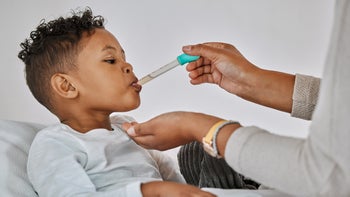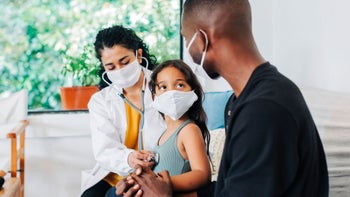
6 Vitamins and Supplements That May Help Your Child’s Immune System
Key takeaways:
It’s normal for kids to get sick. That’s because young children have underdeveloped immune systems and they often encounter germs.
Evidence is mixed about using vitamins to boost a kid’s immune system. In most cases, kids don’t need supplements. They get what they need from the food they eat. This is even true for picky eaters.
The best ways to boost your kid’s immune system is to eat a nutritious diet, get good sleep, and get enough physical activity.
Table of contents

Your very active toddler doesn’t eat much. And they sure seem to pick up lots of illnesses every month. Does that mean they aren’t getting enough vitamins?
Low levels of vitamins are probably not the reason your child keeps getting sick. It’s normal for kids to have frequent colds. In fact, it’s normal for them to have as many as 10 per year. That’s because kids easily pass germs to each other, and they’re still developing their immune systems.
So, what’s the best way to support a child’s immune system? Let’s look at the science behind using vitamins and supplements to boost your child’s immune system.
Search and compare options
Best vitamins and supplements for kid’s immune system
Vitamins are micronutrients that help the body function. Some vitamins play an important role in keeping the immune system healthy.
Does that mean giving your kid vitamin supplements will stop them from getting sick?
No, probably not.
Vitamin deficiencies can impact how well the immune system works. But vitamin deficiencies aren’t common for most children. And there isn’t much evidence that taking supplements can prevent illness.
In fact, the American Academy of Pediatrics doesn’t recommend vitamin supplements for kids with well-balanced diets. And most experts think that even picky eaters get enough to meet their nutritional needs. It’s also important to know that more isn’t always better — it’s possible for kids to overdose on vitamins.
Let’s look at how these six vitamins and supplements affect your child’s immune system. And then learn whether vitamins and supplements can help boost their immune system.
Read more like this
Explore these related articles, suggested for readers like you.
1. Vitamin C
Many people were encouraged to drink orange juice as kids, especially if they were sick with a cold. This is because oranges are rich in vitamin C. And vitamin C helps protect the infection-fighting cells in your body. But a review of the evidence shows mixed results when it comes to vitamin C and a healthy immune system. Vitamin C supplements won’t prevent colds. But they may help shorten the time it takes to recover from a cold — especially if you regularly get plenty of vitamin C. So, giving your child vitamin C may help their immune system work better.
In addition to fruit juices, you can find vitamin C in over-the-counter (OTC) supplements like Emergen-C Kidz. The amount of vitamin C in Emergen-C Kidz (250 mg) exceeds how much kids need in a day. But it’s not harmful when taken as directed, so make sure you follow the dosing instructions. Too much vitamin C can cause nausea, vomiting, and diarrhea.
In addition to vitamin C, Emergen-C Kidz contains B vitamins, calcium, zinc, and magnesium — as well as added sugars for taste.
2. Vitamin D
Vitamin D supports bone health and a healthy immune system. But does giving vitamin D supplements to kids prevent illness? Maybe.
Very low levels of vitamin D are associated with a higher risk of infections. And there’s some evidence that vitamin D supplements can reduce the risk of respiratory tract infections. However, a recent large study found that vitamin D supplements did not prevent pneumonia or diarrhea in children under 5 years old.
In addition to mixed study results, there’s still debate about what level of vitamin D is normal and when supplementation is necessary.
Talk with your child’s pediatrician before starting vitamin D supplements. Your child may need their vitamin D levels checked first so you can figure out what vitamin D dose is best for them.
3. Zinc
Zinc is a trace mineral. This means your body only needs it in small amounts. Although you need very little of it, zinc helps with hundreds of chemical reactions in your body. Including the chemical reactions needed for your immune system to work properly.
In studies, adults who started taking zinc supplements within a day of getting a cold recovered faster. But will zinc help boost a kid’s immune system? There’s not a lot of evidence either way. One study found that zinc made children’s cold symptoms less severe when taken in the first few days after a cold started. However, zinc did not appear to change how long kids were sick. A large review of several studies found that zinc didn’t have any effect on risk of respiratory illness.
So, it’s not clear if zinc really helps boost a child’s immune system. But the good news is that in the U.S. kids get enough zinc in their diet. Skip zinc supplements unless your child has low zinc levels. Getting too much zinc can cause side effects like nausea and diarrhea.
4. Iron
Iron is another mineral with many important jobs in your body. Your body needs iron to help blood carry oxygen, and it has a vital role in immune function.
So, should kids be getting daily iron supplements? Maybe, but it depends on their diet. Iron is available in many foods — including meat, fish, vegetables, and nuts. Breakfast cereals are often fortified, which means that iron is added to them. But even with these options, some kids don’t get enough iron. Even if they don’t have iron deficiency anemia, low iron can impact your child’s immune system and their ability to learn. Studies show that kids who get enough iron have better memory and attention.
But talk with your child’s pediatrician before starting iron supplements. They can check your child’s iron levels to see if there are any signs of iron deficiency. Iron supplements can be hard on a child’s stomach and they don’t taste good. Plus, taking too much iron can be dangerous for kids. Children who accidentally take adult iron supplements or multivitamins can become severely ill. It’s best to know if your child really needs iron supplementation before you start it.
5. Elderberry
Elderberry is a plant that people have used for centuries to treat upper respiratory infections, like the cold and flu. There’s some evidence that elderberry may support your immune system. One study found that taking elderberry did not prevent colds in adults, but it might shorten the duration and severity of colds.
So, should you give elderberry to your child? There isn’t much evidence to support that elderberry can help prevent illness. And there’s even less information about how elderberry may affect a kid’s immune system. A small study that included children over the age of 5 found that elderberry did not improve flu symptoms or recovery time. Since elderberry is a supplement, it’s not regulated by the FDA like prescription or OTC medications are. This also means the amount of elderberry can greatly vary between products.
More research is needed to see if elderberry works and if it’s safe for kids to use.
6. Probiotics
The gut microbiome is made up of “good” gut bacteria that help digest food and support the immune system. In fact, your gut contains about 70% of your immune cells.
Probiotics are live microorganisms that increase the amount of “good” bacteria in your gut when eaten. And there’s evidence that taking probiotics can benefit the adult immune system.
But will using probiotics keep your kid from getting sick? This evidence is also mixed.
In children, probiotics may help prevent antibiotic-associated diarrhea — this is diarrhea that happens when antibiotics that are used to treat an infection kill off all the good bacteria in the gut. But it may not help kids with stomach problems caused by acute gastroenteritis.
Right now, experts don’t recommend routine probiotic use for kids. More research is needed to determine which strains of probiotic bacteria help the most and how much is necessary to provide benefit.
Other ways to boost your child’s immune health
It’s not clear whether vitamins and other supplements boost a child’s immune health. So, what else can you do to keep your child from getting sick?
Good hand washing and not touching your nose and mouth are two of the best ways to prevent the spread of illness. That’s sometimes tough to remember to do, especially for young children.
Here are four other ways to support your child’s immune system and prevent illness.
Sleep
Many parents know the struggle of a cranky toddler who had a bad night’s sleep. Besides mood changes, sleep also affects your child’s immune system.
Work on creating a healthy sleep routine for your child early on. A regular sleep cycle will help boost natural immunity and keep your child healthy.
Diet
You may have heard the saying, “You are what you eat.” That saying also applies to our immune system. Lots of research shows that a nutritious diet promotes good immune function.
Incorporate a variety of colorful fruits and vegetables in your child’s diet. Your kid doesn’t need to eat a lot of these to meet their nutritional needs.
Try creative ways to get these foods into what your child eats. For example:
Add fruits or greens into smoothies
Put veggies on a pizza
Chop veggies up and add them to a favorite meal like mac and cheese.
Physical activity
Being active has lots of health benefits for kids. Physical activity improves heart function, muscle and bone strength, and brain health. Research shows it also boosts immune function.
Experts recommend at least 60 minutes of moderate activity every day for kids ages 6 and older. Encourage exercise by limiting screen time when you can, and try to make physical activity a regular part of your child’s day.
Stress management
Stress means different things to different people. For kids, stress can be any kind of change. Researchers have found that chronic stress can affect immune function. To reduce stress for your child, try to maintain a routine schedule whenever you can. Plan any changes in advance so your kids can prepare. You can also teach your child coping techniques like deep breathing or taking time alone for those inevitable times when they need a break.
The bottom line
Getting enough vitamins and minerals in your diet helps your immune system work well. But there isn’t much evidence that taking supplements can prevent kids from getting sick. The best way to support your child’s immune system is with a healthy lifestyle. Encourage kids to get enough sleep, eat healthy, and stay active to improve immune system function and overall health.
Why trust our experts?



References
Agaoglu, L., et al. (2007). Effects of iron deficiency anemia on cognitive function in children. Arzneimittelforschung.
Alacer Corp. (n.d.). Emergen-C Kidz – fruit punch.
Alacer Corp. (2013). Kidz Vitamin C 250 mg fruit punch [package insert]. National Institutes of Health.
Besedovsky, L. (2012). Sleep and immune function. Pflugers Archiv: European Journal of Physiology.
Canadian Paediatric Society. (2005). Colds in children. Paediatrics & Child Health.
Centers for Disease Control and Prevention. (2022). When and how to wash your hands.
Centers for Disease Control and Prevention. (2022). Why should people be active?
Centers for Disease Control and Prevention. (2022). Zinc.
Centers for Disease Control and Prevention. (2023). How much physical activity do children need?
Depoorter, L., et al. (2021). Probiotics in pediatrics. A review and practical guide. Nutrients.
Dietary Guidelines for Americans. (n.d.). Food sources of iron.
Douglas, R. M., et al. (2004). Vitamin C for preventing and treating the common cold. Cochrane Database of Systematic Reviews.
Guo, Q., et al. (2019). Probiotics for the prevention of antibiotic-associated diarrhea in children. Cochrane Database of Systematic Reviews.
Gutema, B. T., et al. (2023). Effects of iron supplementation on cognitive development in school-age children: Systematic review and meta-analysis. PloS One.
Hassan, T. H., et al. (2016). Impact of iron deficiency anemia on the function of the immune system in children. Medicine.
HealthyChildren.org. (2012). A vitamin a day.
HealthyChildren.org. (2022). Where we stand: Vitamin supplements for children.
Hemilä, H., et al. (2013). Vitamin C for preventing and treating the common cold. Cochrane Database of Systematic Reviews.
Koay, W. L. A., et al. (2019). Probiotics in children: To use or not to use? Contemporary Pediatrics.
Kurugöl, Z., et al. (2007). Effect of zinc sulfate on common cold in children: Randomized, double blind study. Pediatrics International.
MedlinePlus. (2023). Iron overdose.
Moore, A., et al. (2023). The role of vitamin C in human immunity and its treatment potential against COVID-19: A review article. Cureus.
Morey, J. N., et al. (2015). Current directions in stress and human immune function. Current Opinion in Psychology.
Munteanu, C., et al. (2022). The relationship between nutrition and the immune system. Frontiers in Nutrition.
National Capital Poison Center. (n.d.). Iron poisoning.
National Center for Complementary and Integrative Health. (2020). Elderberry.
National Institutes of Health. (2021). Vitamin C.
National Institutes of Health. (2022). Zinc: Fact sheet for professionals.
National Institutes of Health. (2022). Zinc: Fact sheet for consumers.
National Institutes of Health. (2023). Dietary supplements for immune function and infectious diseases.
Nieman, D. C., et al. (2019). The compelling link between physical activity and the body’s defense system. Journal of Sport and Health Science.
Plaza-Díaz, J., et al. (2018). Immune-mediated mechanisms of action of probiotics and synbiotics in treating pediatric intestinal diseases. Nutrients.
Radmanish, M., et al. (2022). Sleep duration trajectories associated with levels of specific serum cytokines at age 5: A longitudinal study in preschoolers from the EDEN birth cohort. Brain, behavior, & Immunity - Health.
Schnadower, D., et al. (2018). Lactobacillus rhamnosus GG versus placebo for acute gastroenteritis in children. The New England Journal of Medicine.
Singh, M., et al. (2013). Zinc for the common cold. Cochrane Database of Systematic Reviews.
Sîrbe, C., et al. (2022). An update on the effects of vitamin D on the immune system and autoimmune diseases. International Journal of Molecular Sciences.
Vlieg- Boerstra, B. (2021). Nutrient supplementation for prevention of viral respiratory tract infections in healthy subjects: A systematic review and meta-analysis. Allergy.
Walker, V. P., et al. (2009). The vitamin D connection to pediatric infections and immune function. Pediatric Research.
Wieland, L. S., et al. (2021). Elderberry for prevention and treatment of viral respiratory illnesses: A systematic review. BMC Complementary Medicine and Therapies.
Wiertsema, S. P., et al. (2021). The interplay between the gut microbiome and the immune system in the context of infectious diseases throughout life and the role of nutrition in optimizing treatment strategies. Nutrients.
World Health Organization. (2023). Fortification of wheat flour.
Yakoob, M. Y., et al. (2016). Vitamin D supplementation for preventing infections in children under five years of age. Cochrane Database of Systematic Reviews.
Yeşiltepe Mutlu, G., et al. (2018). Use of vitamin D in children and adults: Frequently asked questions. Journal of Clinical Research in Pediatric Endocrinology.





























